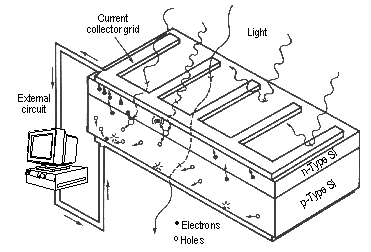|
| |
|
Silicon Info:
Silicon Solar
Cells
|
A silicon solar cell converts sunlight
energy into direct-current (DC) electrical energy by the photovoltaic
effect. As sunlight impinges
on the top surface, some of the light is reflected off the cell's
grid structure and some is reflected by the surface of the cell. The
grid reflection loss can range from 3% for advanced cell designs to as
much as 20% for some screen-printed cells.
Antireflection coatings and texturing of the silicon surface can help minimize the surface reflection losses.
Some light (long-wavelength infrared) does not have the threshold
energy needed to free electrons from the Si atoms and passes through the
cell without interacting. Some light (short-wavelength ultraviolet)
has more than enough energy to create the electron hole pairs. The excess energy transferred to the charge carriers is
dissipated as heat. About 40%
of the incident light energy is effectively used in freeing electrons from
silicon atoms so that they can wander in the crystal lattice. They
leave behind holes, or the absence of electrons, which also wander.
The solar cell has a p/n junction, like a large-area diode. The
n-type portion (typically near the front of the device) has a high density
of electrons and few holes, so generated electrons can travel easily in
this region. The opposite is true in the p-type region. There, holes
travel easily. The electric field near this junction of n- and p-type
silicon causes generated electrons to wander toward the grid on the
surface, while the holes wander toward the back contact. If the
electrons survive their trip across the cell thickness without recombining
at defects or impurities, they are collected at the grid and flow through
an external circuit as current that can operate an electronic instrument
or appliance. After that, they re-enter the solar cell at the back
contact to recombine with holes, and the process repeats.

|
|